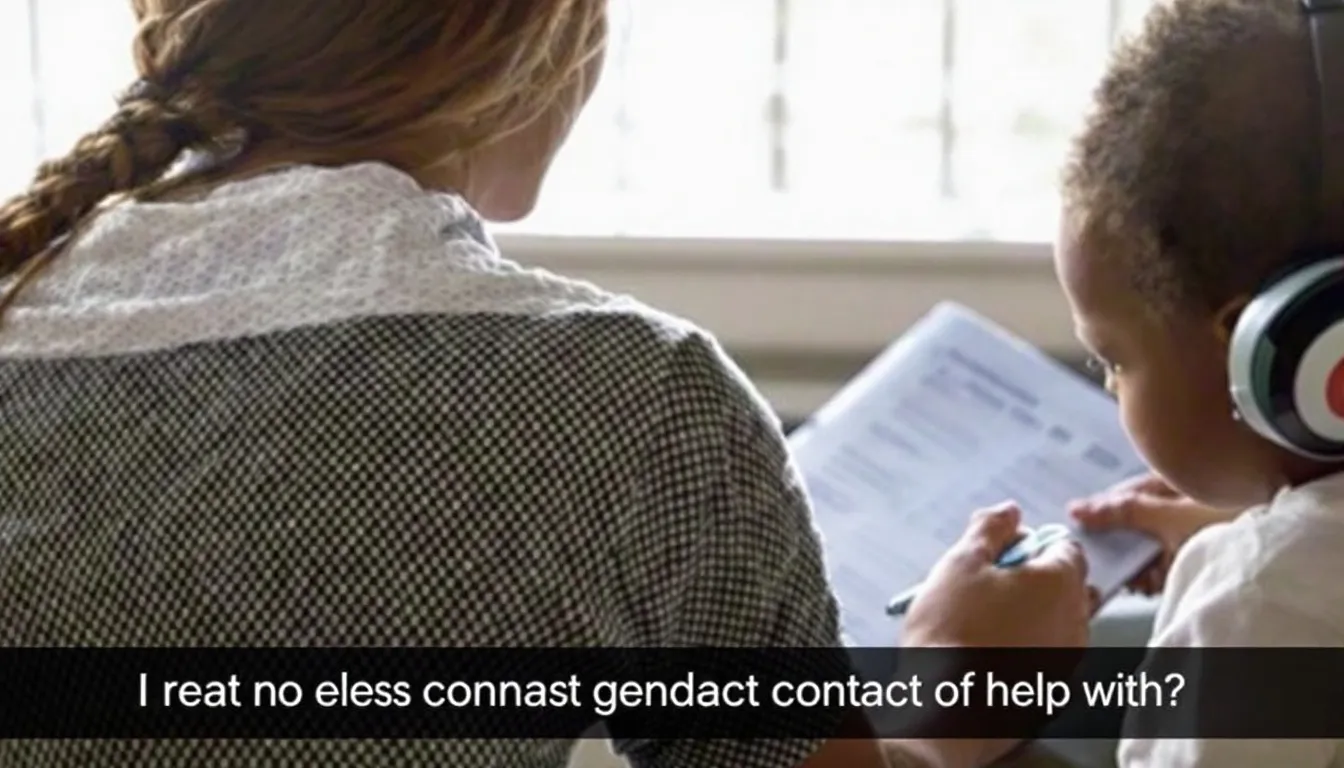
Divorce is a tough time for everyone, especially when children are involved. They often face emotional challenges, disrupted routines, and new family dynamics—all of which can affect their ability to focus in school. Just like Texas Post-Adoption Contact Agreements help birth parents and adoptive families maintain a connection after adoption, you as a parent can take steps to keep your child’s academic life stable during a divorce. From emotional distress to school transitions, the impact of divorce on children’s academic performance is real, and understanding how to minimize this disruption can make a world of difference.
In this blog, we’ll explore how divorce can affect your child’s education, and offer you practical solutions to help your child continue excelling academically despite the changes. We’ll discuss the importance of communication with teachers, establishing a stable home environment, and creating a supportive parenting plan that protects your child’s well-being. Plus, we’ll touch on how Texas courts approach child custody, with an eye on educational stability. At The Law Office of Bryan Fagan, PLLC, we believe in protecting your child’s future, both emotionally and academically—so read on to find out how you can help your child thrive during this challenging time.
Essential Takeaways for Texas Post-Adoption Contact Agreements
- Texas Post-Adoption Contact Agreements are designed to facilitate communication between adoptive families and birth parents, prioritizing the child’s well-being, although they are generally not legally enforceable.
- The agreements can take various forms, including open, semi-open, and closed adoptions, each with different levels of communication and connection, allowing families to choose arrangements that best meet their needs and the child’s identity.
- Effective contact agreements require clear boundaries and healthy communication, involving both birth and adoptive parents in the planning and regular revisiting of terms to address evolving needs and maintain trust.
What are Texas Post-Adoption Contact Agreements?
At the core of any successful adoption lies the well-being of the child, and Texas Post-Adoption Contact Agreements are designed with this goal in mind. These agreements outline the communication and contact preferences between birth parents and adoptive families after the adoption is finalized, fostering a supportive relationship that prioritizes the child’s best interests. As our family law team often advises, maintaining a healthy relationship post-adoption can be beneficial for both the child’s emotional development and the stability of the adoptive family.
These agreements can include a wide range of provisions, such as sharing updates on the child’s well-being, exchanging letters or photos, or facilitating occasional visits. The flexibility of Texas Post-Adoption Contact Agreements allows adoptive families and birth parents to decide on the level of contact that works best for everyone, while always focusing on the child’s emotional needs and identity.
It is important to note, however, that Texas Post-Adoption Contact Agreements are typically not legally enforceable. According to Section 162.012 of the Texas Family Code, post-adoption contact agreements are not binding and depend on mutual trust and respect between both parties. These agreements are often negotiated with the help of adoption agencies, which guide families through the emotional complexities and legal considerations involved.
For more information on how these agreements work and the legal implications for all parties involved, our firm offers detailed insights in our blog post, Navigating Texas Post-Adoption Requirements: Essential Guidelines for Parents. As always, understanding your rights and responsibilities within Texas adoption law is crucial for making informed decisions that best serve your family’s needs.
To ensure the success of a post-adoption relationship, we recommend that families work closely with an experienced Texas family law attorney. Having legal guidance throughout this process can help clarify expectations and prevent misunderstandings. For additional resources, we encourage you to explore our blog post on Understanding the Adoption Process in Texas, which offers further practical advice for navigating adoption in Texas.

Types of Post-Adoption Contact Agreements
Texas provides a range of Texas Post-Adoption Contact Agreements, from open to closed arrangements, each designed to specify the level of communication and interaction between birth parents and adoptive families. These agreements play a vital role in helping to maintain a connection after adoption, while prioritizing the child’s best interests. According to the Texas Family Code, these agreements can vary depending on the preferences of the birth parents and adoptive families, allowing for flexibility in how much contact is maintained.
Adoptive families should carefully consider these different options to determine which type of post-adoption contact arrangement best suits their unique circumstances and the needs of the child. Whether choosing an open, semi-open, or closed adoption agreement, it is essential to weigh the child’s emotional needs, identity, and overall well-being. As our family law team often advises, working with legal professionals who understand the nuances of Texas adoption law is crucial to ensuring that all parties make informed decisions.
For more details on the legal framework surrounding adoption and the role of contact agreements, we recommend reading our detailed blog post on Legal Requirements and Documentation for Adult Adoption in Texas. In addition, understanding how these contact arrangements are implemented in practice can help guide adoptive families in making the right choices for their future.
To learn more about other aspects of adoption in Texas, we encourage you to check out our blog on The Adoption Process in Texas: A Step-by-Step Guide, which provides further insight into the legal procedures and documentation involved in adoption.

Open Adoptions
Open adoptions are characterized by ongoing communication and direct relationships between birth parents and adoptive families. This type of arrangement can include regular updates, photos, and even in-person visits, allowing the child to maintain a connection with their biological roots.
The benefits of open adoptions are manifold:
- They provide the adopted child with a sense of identity and continuity, helping them understand their background and heritage.
- For birth parents, open adoptions offer reassurance and a continued bond with their child.
- Meanwhile, adoptive parents gain a deeper understanding of their child’s history, fostering a more inclusive family narrative.
Semi-Open Adoptions
Semi-open adoptions strike a balance between openness and privacy. In these arrangements, contact is limited and often mediated by a third party, such as an adoption agency. This allows for some level of connection without the complete openness seen in fully open adoption adoptions.
These agreements typically involve sharing non-identifying information and updates through a mediator. This helps maintain a level of privacy while still facilitating a connection between the child and their birth mother and relative birth parents, including any adult relatives.
Semi-open adoptions can be particularly beneficial for two families seeking a middle ground that respects both parties’ needs and boundaries.
Closed Adoptions
Closed adoptions are defined by the complete absence of identifying information or contact between birth and adoptive families. In these arrangements, all records are sealed, ensuring confidentiality and anonymity for both parties.
Families might choose closed adoptions for various reasons, including the desire for privacy and a clean slate for the adopted child. While this type of adoption can provide a sense of security and closure, it also means that the child may have limited access to information about their biological roots. Understanding these dynamics is crucial for families considering this option.
Negotiating Post-Adoption Contact Agreements in Texas
Negotiating Texas Post-Adoption Contact Agreements requires careful attention to both legal and emotional factors. These agreements, which outline the level and nature of communication between birth parents and adoptive families, are essential in maintaining a connection while prioritizing the child’s well-being. Adoption agencies play an important role in facilitating these discussions, helping both birth parents and adoptive families navigate the complexities of post-adoption relationships.
According to Section 162.012 of the Texas Family Code, Texas Post-Adoption Contact Agreements are not legally enforceable but can serve as a crucial framework for ensuring cooperation and mutual understanding. As such, it’s important for families to approach these agreements thoughtfully and with guidance. Experienced family law attorneys, like those at The Law Office of Bryan Fagan, PLLC, are invaluable in ensuring that these agreements meet legal standards, protect the rights of all parties involved, and align with the child’s best interests.
For further insights on how these agreements are structured and their implications, we recommend reading our blog post on Legal Requirements and Documentation for Adult Adoption in Texas. In addition, understanding the role of family law professionals in adoption processes can help ensure that all legal aspects are covered. For more information on Texas adoption law, feel free to explore our post on Understanding the Adoption Process in Texas.

Factors Considered by Courts
When Texas courts evaluate post-adoption contact agreements, the child’s best interests are paramount. Courts consider various factors, including the level of parental involvement in the child’s life and the stability and continuity of the child’s environment. Clear terms and well-defined agreements are crucial to ensure that all parties understand their rights and responsibilities.
Courts aim to create arrangements that best serve the child’s emotional and physical well-being. This means prioritizing stability and continuity in the child’s custody placement, which can significantly impact their overall development and adjustment post-adoption.
Legal Enforceability
For post-adoption contact agreements to be legally enforceable, they must be written, signed by all parties, and deemed to serve the child’s best interests. Courts can enforce these agreements under specific conditions, including clear terms and attempts at mediation for any disputes.
While modification of these agreements is generally not permitted, ensuring stability in the child’s post-adoption arrangements, it’s crucial for all parties to understand the legal framework and resources available to support the child’s best interests.
Role of Family Law Attorneys
Family law attorneys play a pivotal role in navigating the complexities of post-adoption contact agreements. Their expertise ensures that the agreements are legally sound and prioritize the best interests of the child. Without legal representation, families might not fully understand their rights or the implications of the agreements they are entering into, potentially jeopardizing the adoption process.
Attorneys skilled in family law are adept at negotiating terms that consider the needs of all parties involved. They bring extensive knowledge of the legal framework surrounding post-adoption agreements, ensuring that these agreements are appropriately structured and protect everyone’s interests.
Benefits and Challenges of Post-Adoption Contact
Texas Post-Adoption Contact Agreements provide numerous benefits, including reducing anxiety and promoting stronger emotional attachment in adopted children. These agreements are vital in helping children foster a sense of identity and continuity, which supports their emotional and psychological well-being. For adoptive families, these arrangements can enhance understanding and create a more inclusive family narrative, facilitating better relationships and mutual respect.
However, Texas Post-Adoption Contact Agreements can also present challenges. Balancing the adoptive parents’ needs with the child’s desire to stay connected with their birth family can be emotionally complex. As our family law team often advises, establishing clear expectations and boundaries from the outset is essential for managing these complexities and ensuring a respectful and harmonious relationship between all parties involved.
According to Section 162.012 of the Texas Family Code, Texas Post-Adoption Contact Agreements are generally not legally enforceable but can serve as a critical tool for fostering cooperation and maintaining connections. To ensure these agreements meet legal standards and protect everyone’s interests, working with an experienced family law attorney is crucial.
For more information on the intricacies of post-adoption agreements, we recommend reading our blog post on Adopting an Adult in Texas: A Comprehensive Guide. If you’re navigating adoption or need further clarification on Texas adoption law, don’t hesitate to explore our post on Texas Adoption Process: What You Need to Know. This guide provides valuable information for adoptive families, ensuring that all legal aspects are understood and addressed.

Actionable Advice for Creating Effective Contact Agreements
Creating effective Texas Post-Adoption Contact Agreements hinges on clear communication and mutual understanding between birth parents and adoptive families. As our family law team often advises, involving both parties in the adoption planning process is key to establishing a strong foundation of trust and commitment. By working collaboratively, birth and adoptive parents can ensure that the child’s best interests are prioritized, and expectations are clearly defined from the outset.
According to Section 162.012 of the Texas Family Code, Texas Post-Adoption Contact Agreements are not legally enforceable but can still serve as an essential tool in maintaining a positive relationship between birth and adoptive families. These agreements are based on the mutual goodwill of all parties and should be flexible to meet the evolving needs of the child and the families involved.
Regularly revisiting and updating these agreements is crucial to ensure that they remain relevant as circumstances change over time. This practice allows adoptive families to adapt to the child’s needs, emotional growth, and any changes in the family dynamic. By keeping these agreements current, families can foster an environment of continued support and cooperation.
For more information on how Texas Post-Adoption Contact Agreements can be structured and managed, we encourage you to read our blog post on Comfort in Adoption: Understanding Post-Adoption Support. Additionally, for further insights into the adoption process and maintaining a stable post-adoption relationship, check out our blog post on Creating a Stable Environment for Adopted Children, which provides helpful advice for adoptive families.

Setting Boundaries
Setting clear boundaries is essential for establishing healthy communication in post-adoption contact agreements. These boundaries help ensure that all parties feel comfortable and secure, creating a foundation for positive interactions.
Communicating personal needs and boundaries from the outset, and defining the frequency and methods of communication that work best for everyone involved, is essential. This proactive request approach helps prevent misunderstandings and fosters a respectful relationship.
Maintaining Healthy Communication
Maintaining healthy communication requires active listening and empathy. These skills are crucial for building trust and understanding between birth and adoptive families, ensuring that all parties feel hearing and valued, including the baby.
Regular check-ins and open dialogue can help address any concerns or issues that arise, ensuring that the contact agreement continues to serve the best interests of everyone involved. Support from adoption agencies and professionals can also be invaluable in facilitating positive communication and assistance. If you visit regularly, it can strengthen these relationships.
Real-World Examples and Case Studies
Real-world examples and case studies provide valuable context, illustrating the positive impact of well-negotiated Texas Post-Adoption Contact Agreements. These agreements are essential in helping families maintain connections that foster the child’s emotional well-being, even after the adoption is finalized. For instance, one Texas family shared how their adopted child maintained a relationship with a biological sibling, which significantly enhanced the child’s sense of security and identity. This ongoing connection provided emotional stability, allowing the child to feel rooted in both their adoptive and biological family histories.
In another case, an adoptive family found that clearly defining communication methods in their post-adoption agreement helped resolve misunderstandings with the birth parents. By establishing clear guidelines for communication, they were able to improve their co-parenting dynamic, fostering a more cooperative and respectful relationship. These examples underscore the importance of clear terms and mutual understanding in creating successful, positive post-adoption relationships for everyone involved.
As our family law team often advises, the Texas Family Code emphasizes the importance of protecting the child’s best interests, and Texas Post-Adoption Contact Agreements are key to achieving that goal. While these agreements are not legally enforceable under Section 162.012, they serve as an essential tool for maintaining healthy, ongoing relationships between birth parents and adoptive families.
For more information on post-adoption agreements and their role in Texas adoption law, we recommend reading our blog post on Universal City Adoption Services. Additionally, our post on Navigating Post-Adoption Legal Matters in Texas offers further insights into the legal aspects of post-adoption contact and how families can ensure that their agreements reflect their evolving needs.

Conclusion:
Divorce is a challenging experience for everyone involved, but with the right approach, you can help your child navigate this difficult time while keeping their academic life on track. Whether it’s ensuring stability in their routine, staying connected with school staff, or creating a supportive environment across households, the steps you take now can make a lasting difference in their future.
Remember, you don’t have to do this alone. An experienced Texas Family Law Attorney can guide you through creating a parenting plan that protects your child’s emotional and academic well-being. At The Law Office of Bryan Fagan, PLLC, we’re here to support families like yours, ensuring that both parents and children thrive, no matter what challenges lie ahead.
So, take a deep breath and know that with the right resources and support, your family can make it through this. If you’re feeling unsure about how to move forward or need help crafting a plan that works for your child, don’t hesitate to reach out. We’re here to help you protect your child’s future, every step of the way.
Adoption FAQs
A post-adoption contract agreement is a formal arrangement between birth parents and adoptive families to allow ongoing contact or updates after an adoption is finalized. These agreements can vary in terms of the level of contact, from sharing information to in-person visits.
Once an adoption is finalized in Texas, the biological parent’s rights are typically terminated, and they cannot regain custody of the child. The adoptive parents are granted full parental rights.
In some cases, birth parents can contact an adopted child if there is a post-adoption contact agreement in place. However, this depends on the type of adoption (open, semi-open, or closed) and the specific terms of the agreement.
Adoption contracts, including post-adoption contact agreements, are generally not legally enforceable in Texas. While these agreements are important for maintaining a relationship, they rely on the cooperation and goodwill of the parties involved.
A PACA (Post-Adoption Contact Agreement) is not legally binding in Texas. While it establishes agreed-upon contact terms, it is typically not enforceable in court. However, it can serve as a guide for future interactions.
A post-termination agreement is an arrangement that may be made after the termination of parental rights, which often involves terms for future contact between the birth parents and the child, or the adoptive family, similar to a post-adoption contact agreement.
Once an adoption is finalized, birth parents cannot take back an adopted child. The adoption process legally transfers parental rights to the adoptive parents, and birth parents no longer have legal rights over the child.
In some cases, birth parents can contact an adopted child if there is a post-adoption contact agreement in place. However, this depends on the type of adoption (open, semi-open, or closed) and the specific terms of the agreement.
In Texas, there is no legal requirement that adoptive parents must tell their child they are adopted. However, it is generally encouraged to be honest with children about their adoption to foster a healthy sense of identity.
Bryan Fagan is a Texas family law attorney with a heart for adoption—inspired not just by his legal career, but by his own family story. Growing up in Atascocita with two adopted brothers, Bryan learned early the profound meaning of chosen family. His passion for justice was sparked by John Grisham’s The Pelican Brief, and he became the first lawyer in his family, balancing night classes at South Texas College of Law while caring for his grandmother with Alzheimer’s.
Today, Bryan brings that same dedication to his practice, guiding families through adoptions, custody disputes, divorces, and complex marital agreements. A certified member of the College of the State Bar of Texas, he combines elite legal expertise with genuine empathy—drawing from his roles as a husband, father of three, and advocate for families facing false CPS allegations.
Based in Houston, Bryan is actively involved in the Houston Bar Association’s Family Law Sector and statewide family law organizations. Whether finalizing an adoption or protecting parental rights, he believes the law should reflect the deepest values of home, commitment, and love.

